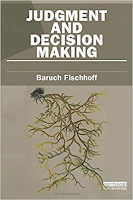8 Great Books Setting the Scene for Agile
Best Agile books by greatest minds
In the course of research for writing new posts, I came across some great minds who explained different aspects of Agile well before it became mainstream.
The beauty of these books is that they don't sell Agile but teach it by science, logic, and expertise.
Daniel Kahneman's "Thinking: Fast and Slow"
The Nobel Prize winner Daniel Kahneman explains out thinking processes, rational and non-rational motivations, cognitive biases, and the prospect theory, which alone should be the basic knowledge of any educated person (I only read it a month ago, but I insist :)Without out understanding what happens inside our brain that motivates and ignites us to think and act outside the, there is no reason to get any deeper into innovation, disruption, or transformation box.
Herbert Simon's "Administrative Behavior"
explains bounded rationality, which basically means that we're not rationally thinking "homo economicus" from "The Limitless" but human beings with poor processing capacity and competence gaps.
Agile transformation should start from understanding why and how we're imperfect, just as the companies we work for.
John Kotter's "Accelerate: Building Strategic Agility for a Faster-Moving World"
provides the extended view on his popular concept of the Dual Operations System.
Unlike many pamphlets on agile business transformation, this book is based on the author's practical experience and gives actionable advice, not just fuzz and slogans.
Robert Cringely's "Accidental Empires"
for those who like "Silicon Valley" but not only looking for laughs.
Great ideas, fantastic associations, razor-sharp style. Trimodal IT ideated nearly two decades ahead of Gartner!
Here's a teaser of his provoking mindset. Would you still believe that agility brings joy and happiness?
Dean Kashiwagi's "How to Know Everything Without Knowing Everything"
Dr. Kashiwagi is the father of Infomation Management Theory. He suggests neat and intuitive ideas on overcoming the effects of bounded rationality and dethrones the decision-making many of us are so proud of.
Possibly, he provides the best advice on becoming agile by following natural laws and common logic.
David J. Teece's "Dynamic Capabilities and Strategic Management: Organizing For Innovation And Growth"
David J. Teece is the pioneer of dynamic capabilities theory. Agility is not the magic bullet by itself; it is only one of many capabilities a firm needs to acquire and develop to stay in the race.
Baruch Fischhoff's "Judgement and Decision Making"
Basically, agile is all about making the right decisions under risk.
Baruch Fischhoff is the undisputable leader in the research field of decision making, risk perception, and risk analysis. Besides being the student of Daniel Kahneman and Amos Tversky, fathers of the prospect theory, he used to be the President of the Society for Risk Analysis and Society for Judgement and Decision Making.
Stewart Brand's "How Buildings Learn: What Happens When They're Built"
Stewart Brand explains the pace-layering concept that assumes that different layers of buildings (and our civilization) develop at different speeds. Fast layers represent agility and innovation, slow layers - constraint and constancy. Many readers of this book insist it is about software development and explains the origins of Scrum and other agile practices.
This blog is featured by Feedspot among the Top 35 Procurement Blogs. Please vote for us!
To keep receiving new insights and research, please subscribe here.
More information on this and other exciting topics could be found in "The Technology Procurement Handbook." It represents 23 years of experience, billions of dollars worth of successful sourcing projects, and 1000s of hours spent on research, analysis, and content creation for the most demanding professional readers.












Comments
Post a Comment